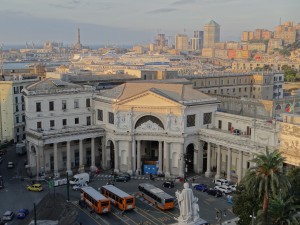 To Rafael Sastre González
To Rafael Sastre González
Hotel Savoia
Cortina d’Ampezzo, Italia. 8 de Julio, 1940
Querido Rafael:
tu cariñosa carta me encuentra en Cortina, lugar ahora mas tranquilo que nunca, pues no hay extranyeros, y los italianos se contentan con pocas semanas de veraneo. No eres tú el único que se acuerda de mí en las circumstancias de este momento, y es verdad que estoy algo aislado. Mi antiguo amigo Strong, con quien vivía yo en otros tiempos en Paris, ha muerto, y las demas conocidos americanos e ingleses que vivían en Italia se han marchado; pero yo estoy bien de salud y muy a gusto haciendo vida de hermitaño con sala de baño. Sigo trabajando, en parte por tener ocupación y en parte por compromisos con varios editores, y esta guerra no me pesa como la otra, de hace veinte años. Me parece que leo historias antiguas, ilustrando las mismas verdades eternas. Mercedes, que tiene 83 años, tambien me anima a volver á España y me ofrece su casa, o sus casas, pues tiene dos, y yo ninguna; pero eso es por ser yo filósofo. Y en los Estados Unidos aún quedan algunas personas que se agitan, pensando que lo debo pasar muy mal aquí, entre invasiones y bombas: pero ocurre todo lo contrario. Sería allí que no me dejarían vivir en paz. Ademas los viajes por ahora son imposibles, y en Italia nadie me molesta, y los proprietarios de las fondas en donde acostumbro a parar, tanto aquí como en Venecia y en Roma, estan muy atentos, y hasta ofrecen fiarme el pago de la cuenta hasta que se haga la paz, si fuese necesario. No creo que lo sea, pues no faltaría medio de girar dinero de los Estados Unidos indirectamente, aunque éstos no permanecieran neutrales, cosa poco probable. Sí llegase el caso de tener que marcharme, sería sin duda a España que me dirigiría, y a tu casa; no olvido las largas temporadas que he pasado entre vosotros, y aunque falten personas queridas quedan otras que lo son tambien, y gente jóven para recordarnos que no se acaba el mundo con nosotros.
Cariñosos recuerdos a todos, y un abrazo de tu tío que te quiere Jorge Santayana
(Pongo el apellido por la censura)
Translation:
Dear Rafael:
your affectionate letter finds me in Cortina, a place that is now more peaceful than ever, for there are no foreigners, and the Italians are satisfied with a few weeks of summer vacation. You are not the only one who remembers me in the circumstances of the moment, and it is true that I am somewhat isolated. My old friend Strong, with whom I lived in Paris in another era, has died, and the rest of my American and English acquaintances who lived in Italy have left, but I am well and very happy leading a hermit’s life with a bathroom. I continue to work, partly to keep busy and partly because of commitments to various publishers, and this war does not weigh on me like the other one, twenty years ago. It seems to me that I am reading old stories, illustrating the same eternal truths. Mercedes, who is 83, is also urging me to return to Spain and offers me her house, or her houses, for she has two, and I have none; but that’s because I am a philosopher. And in the United States there are still a few people who fuss, thinking that I must be having a very difficult time of it here, with invasions and bombs, but just the opposite happens. It’s there that they wouldn’t let me live in peace. Besides, for now trips are impossible, and in Italy no one bothers me, and the owners of the hotels where I usually stay, here as well as in Venice and in Rome, are very attentive, and even offer to give me credit until peace comes, if necessary. I don’t think it will be, for there would be a way of transferring money from the United States indirectly, even if it did not remain neutral, which is improbable. If it turned out that I had to leave, it is no doubt for Spain that I would head, and your house; I haven’t forgotten the long periods of time that I spent among you, and although some loved ones are missing there are others, and young people to remind us that the world doesn’t end with us.
Fond regards to all, and an embrace from your uncle who loves you George Santayana
(I put my last name because of the censorship)
From The Letters of George Santayana: Book Six, 1937-1940. Cambridge, MA: The MIT Press, 2004. Location of manuscript: Collection of Sra. Rafael (Adelaida Hernandez) Sastre, Avila, Spain
 To Morton Dauwen Zabel
To Morton Dauwen Zabel
 To George Sturgis
To George Sturgis To Mr. Rubin
To Mr. Rubin To George Sturgis
To George Sturgis To Rafael Sastre González
To Rafael Sastre González